Meta, the parent company of Facebook and Instagram, announced plans Thursday to build seven new solar projects in Georgia and Tennessee, doubling its renewable energy portfolio in the Peach State.
The seven projects, totaling 720 megawatts, will be built, owned and operated by Nashville-based Silicon Ranch to support Meta’s renewable energy goals. In Georgia, Meta and Silicon Ranch will partner with energy cooperative Walton EMC to build three of the new solar projects. The Tennessee Valley Authority is the other partnering utility on four solar installations planned in the Volunteer State.
Meta has corporate offices in Atlanta, but it’s biggest energy needs involve a massive data center campus along I-20 in Newton County, about an hour east of Atlanta. Data centers require massive amounts of electricity to power and cool. Many large data center operators have pledged to seek renewable energy sources to reduce the carbon footprint of these facilities, which are vital Internet and cloud computing infrastructure.
“We are proud of the work we have done with Walton EMC and TVA to accelerate the transition to renewables in Georgia and the Tennessee Valley,” said Urvi Parekh, head of renewable energy at Meta, said in a statement.
Meta is already under contract with seven solar farms in Georgia for 560 megawatts of energy. Six of the seven are operational, and all were built by Silicon Ranch as part of the 2018 agreement Meta struck with Walton EMC to provide renewable energy equivalent to 100% of its Newton County data center’s energy demands.
In its statement, Meta praised Silicon Ranch for delivering projects on schedule, “despite supply chain constraints that caused project delays across the solar industry.”
The three new Georgia solar farms are expected to produce an additional 560 megawatts. Meta said it will work with its partners to deliver these projects over the next three years.
Including the seven projects announced Thursday, Meta said it is working with Silicon Ranch on 16 total solar facilities in Georgia and the Tennessee Valley.
A note of disclosure
This coverage is supported by a partnership with 1Earth Fund, the Kendeda Fund and Journalism Funding Partners. You can learn more and support our climate reporting by donating at ajc.com/donate/climate/
About the Author
Keep Reading
The Latest
Featured



